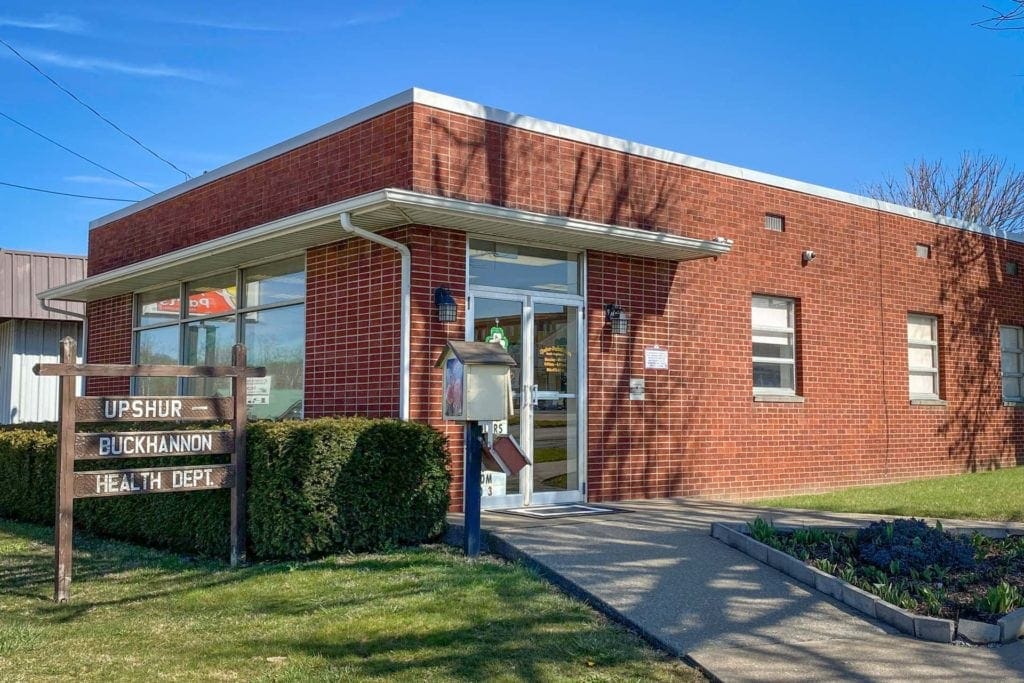“Fear is not going to be constructive. Being totally aware, and totally on guard, and totally prudent in our thinking, is how we need to be… Some way, somehow, we’ll get through this.”
Those were the words of Governor Jim Justice in a press conference Thursday afternoon at which he announced new measures the state will be taking to help limit the spread of COVID-19 in West Virginia.
Those include the immediate suspension of the high school state basketball tournaments, a state employee travel ban, ordering state agencies to avoid holding large meetings and asking all West Virginians to reconsider all non-essential travel out of the state.
“We should continue to live our lives the best we can, but we need to be smart. We really need to be smart,” Justice said.
The governor said public schools will not be closed – at least, not yet.
“This changed in the last 24 hours in a big way,” Justice said. “If it changes again in the next 24 hours in a big way, we’re probably looking at shutting schools down.”
Students at increased risk should consider individual plans for distance learning, Justice said, adding that schools should also think about eliminating extracurricular activities.
Upshur County Schools superintendent Dr. Sara Stankus said school officials from around West Virginia are in Charleston and will be meeting with the state superintendent and state health department Friday. She expects to have more information after that meeting.
In the meantime, Stankus said the school system has relaxed its policy regarding sick days.
“Upshur County Schools have relaxed the ‘sick’ day policy and are encouraging parents not to send children to school who are exhibiting any signs of flu-like symptoms,” she said in a statement released Thursday afternoon. “We are not pressuring parents over these absences as we want these students to remain home during these times.”
Stankus said Upshur County schools will not close unless ordered to do so by the state.
“As a public school system, I do not have the authority just to close our school system doors and have no students report,” she said. “We are receiving constant communication from the W.Va. Department of Education and public health organizations regarding the virus and the steps that we are to take. We will not be closing the schools unless the state directs us to do so as the legislature requires that we complete 180 days of instruction.”
The superintendent added that Upshur County is preparing for a potential school closure and is ready to act immediately if the situation arises.
“I will continue working very closely with representatives from the WVDE and will be ready to immediately act on their directive,” Stankus said. “Upshur County Schools have begun to put alternative plans in place should we be directed to do so.”
The Event Center at Brushy Fork announced it would be canceling all events for the weekend of March 13-15 and evaluating how to proceed moving forward.
“In light of a recent memo from the CDC and suggestions from health officials, our facility felt it was in the best interest of the community’s health to cancel all events scheduled this weekend,” the Event Center at Brushy Fork posted on social media. “Our Board of Directors will meet in the coming days to develop an action plan for all other scheduled events throughout March, April and into May.”
The West Virginia Maple Syrup Festival also announced that this year’s event — scheduled for March 21-22 in Pickens — had been canceled.
“It is with deep regret that we have decided to cancel this year’s festival and all events corresponding to it,” the festival said in a social media post Thursday evening. “This is not a decision that was made lightly. As many of you know, we are a small town with volunteers who put many hours into planning for this event. Our concern lies in what may transpose in the coming days for public events and for the health and safety of visitors and our community members.”
Meanwhile, testing continues to be limited in West Virginia, with just eight tests performed to date. Dr. Catherine Slemp, State Health Officer for the Bureau for Public Health, could not say exactly many tests could be completed per day in the Mountain State.
“We’re doing the most we can,” she said. “Right now, the risk to the average West Virginian is still low.”
Locally, Upshur-Buckhannon Health Department Nurse Director Sue McKisic offered residents advice regarding the coronavirus – don’t panic but don’t dismiss it, either.
On Thursday, McKisic said residents should be concerned and plan for possible self-isolation and social distancing — but avoid veering to one extreme or the other.
“I’ve seen a bit of both, and I think we should be concerned,” McKisic said of those who are either panicking or ignoring the virus. “Stay updated and only get information from the CDC (Centers for Disease Control) or our state website. Those are updated every afternoon, those are the most accurate, and just reading the information there can put a lot of people at ease.”
Coronavirus Disease 2019, or COVID-19, is a respiratory illness caused by a new coronavirus designated SARS-CoV-2, according to the West Virginia Department of Health and Human Resources’ informational page on the pandemic. The outbreak of COVID-19 originated in Wuhan City in Hubei Province, China in December 2019.
As of Wednesday evening, March 11, West Virginia had tested eight residents for COVID-19. Seven test results returned negative, while one is still pending, according to the DHHR.
However, as of Thursday morning COVID-19 has been identified in 42 states and the District of Columbia, with cases totaling 1,215, 36 of which resulted in fatalities, according to the CDC. Those numbers include confirmed or presumed cases tested at the CDC since Jan. 21, 2020.
Odds are, COVID-19 will likely wind up in West Virginia, McKisic said.
“As widespread as it is, more than likely we’re going to see it in Upshur County, but if you wash your hands and don’t touch your face, your nose and your mouth, and take the precautions, a lot of people aren’t even going to be affected by it,” McKisic said. “I think people need to be prepared if they need to shelter in place or self-isolate and make sure that they’ve got items they need.”
It’s not necessary, however, to rush out and buy generators or panic that the flow of potable water or electricity will be interrupted due to the respiratory illness.
“It’s not likely to shut down our water system or affect electricity,” she said. “We should practice social distancing, which is staying about six feet from people, and refrain from hugging when we see someone at Walmart and wave instead.”
The reason in-person classes have been canceled or suspended at West Virginia University, Marshall University and West Virginia Wesleyan College is because students come from such a wide range of areas – and may be traveling to an even wider range during spring breaks.
When it comes to testing, the DHHR has outlined certain criteria to follow, and only individuals who fall within the “high-risk” category will be tested.
Those criteria include having traveled out of the country or to a high-risk area during the past 14 days, having a fever of 100 degrees or above and shortness of breath.
“If the area that you have traveled to is not considered high-risk, then [the state health department] considers you low-risk and you’re not tested,” McKisic said. “They may test for flu, however, or they may do a respiratory panel.”
When high-risk or questionably high-risk individuals visit a health care provider, county health departments are required to notify the state, which then collects pertinent personal information, including details about where the person has traveled, how high their fever is, etc.
“Then, we call the state and we relay that information to the state lab, and they tell us whether we’re allowed to test or not,” McKisic said. “If they’re low-risk, they’re going to tell us no.”
But people may also get tested via LabCorp in Bridgeport or with other private testing facilities with a doctor’s order, she said.
The Upshur-Buckhannon Health Department has collection sample kits to test five individuals for COVID-19. The kits must be refrigerated and space is limited, and they also expire after a certain time period.
“Right now, we have five [collection sample kits], and as we need more, we’ll get them, but they’re not going to overload us with too many because we have to keep part of the kit refrigerated,” McKisic said.
“It is not a specific kit that says ‘coronavirus,’ it is oral and pharyngeal swabs, so they swab the nose and swab the throat then there is a blood draw, and sputum, if necessary,” she added. “Normally, they would do a respiratory panel and send those materials off to the state laboratory and make a determination. We have to keep them fresh, and as we need more, they will send them to us. If it would hit Upshur County, I’m sure they would be sending all kinds of kits and make sure that St. Joseph’s Hospital and other medical providers have them.”
Moreover, once an outbreak is declared – and the number of cases that qualify as an outbreak depends on the illness – more testing materials will become available.
For instance, an outbreak of influenza A and B was declared in the county earlier this year, but that’s no longer the case.
“We do not have an outbreak of the flu in Upshur County at this time,” McKisic said. “There may be a facility that has an outbreak in their facility, but it’s not countywide.”
When it comes to symptoms, what differs from flu symptoms – both A and B – is the marked shortness of breath.
“It causes shortness of breath, so that is causing issues with the lungs, and people who are immuno-compromised – older people, small children – it’s affecting them most,” McKisic said. “A normal healthy person could probably have it and never even know it.”
People who have a fever of 100 degrees or above, a cough and shortness of breath should be concerned, and according to the CDC’s website, cases have varied from people with mild symptoms to severe illness and death for confirmed COVID-19. Symptoms usually appear two to 14 days after exposure.
McKisic said county health departments are working with local Departments of Homeland Security and Emergency Management, the Center for Threat Preparedness and the state Office of Lab Services to develop mitigation plans.
“It’s a virus that we can get over,” she said.













